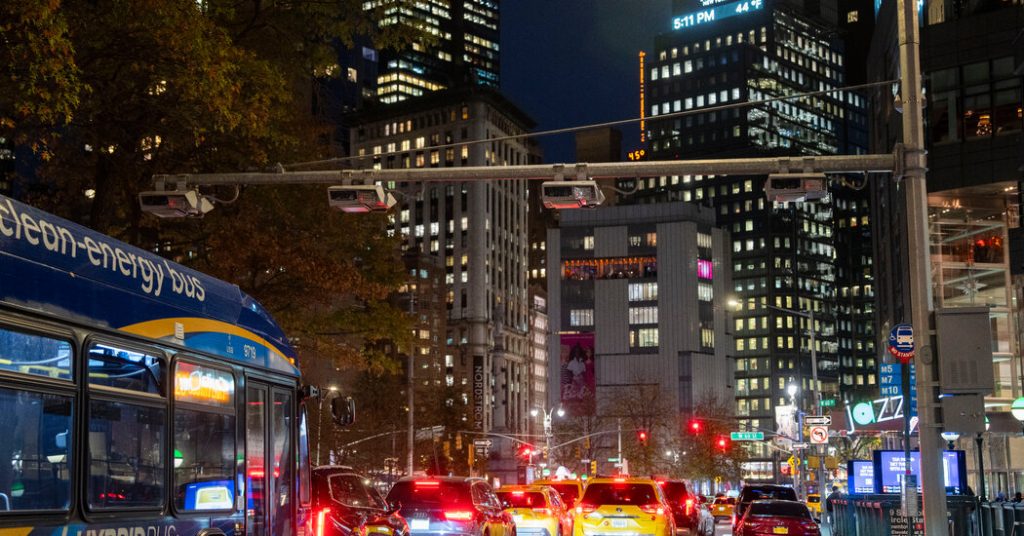New York City’s ambitious congestion pricing plan, designed to alleviate traffic congestion, reduce harmful emissions, and generate crucial funding for public transit, overcame a significant legal hurdle on Friday, paving the way for its implementation on Sunday. A federal judge denied New Jersey’s emergency request to halt the program, a decision celebrated by New York officials who have long championed the initiative. The program, the first of its kind in the United States, will charge most drivers $9 to enter Manhattan’s central business district south of 60th Street during peak hours. The collected revenue, projected to reach $15 billion, will be earmarked for vital repairs and upgrades to the city’s aging subway and bus systems, extending benefits to commuters in the surrounding suburban areas as well. The legal victory marks the culmination of years of planning, public debate, and numerous legal challenges, including at least ten lawsuits aimed at derailing the program.
The implementation of the congestion pricing program has been fraught with delays and political maneuvering. New York Governor Kathy Hochul initially paused the program’s launch in June before reviving it after the November elections, adjusting the initial proposed fee of $15 down to the current $9. New Jersey’s lawsuit, considered the most substantial threat to the program’s launch before the incoming presidential administration, centered on concerns about the potential environmental impact on communities near Hudson River crossings. Negotiations between Governor Hochul and New Jersey Governor Philip Murphy, involving a proposed financial settlement in exchange for dropping the lawsuit, ultimately proved unsuccessful.
The legal proceedings took a decisive turn when Judge Leo M. Gordon ruled on Monday that New Jersey’s legal arguments lacked sufficient merit to warrant a complete shutdown of the program. However, he did order federal agencies involved in the program’s approval to provide further analysis of the potential environmental impacts and mitigation strategies. New Jersey officials, interpreting this request as a partial victory, sought to delay the program’s start until the additional analysis was completed. This led to a New Year’s Eve request for an emergency injunction, which was ultimately denied by Judge Gordon on Friday following a lengthy hearing that included private discussions with legal representatives.
The Friday hearing witnessed intense legal arguments and passionate pleas from both sides. New Jersey’s legal team argued that the judge’s request for additional environmental information necessitated a postponement of the program, citing concerns about increased pollution. However, lawyers representing the MTA and the federal government countered that there was no legal basis for delaying the Sunday launch. The judge’s decision, delivered without detailed explanation, cleared the path for the program’s commencement, a significant win for proponents who view it as a crucial step towards addressing the city’s transportation challenges and environmental concerns.
While the program is set to begin, the legal battles are far from over. Opponents, including a union representing emergency medical workers, voice concerns about the financial burden on essential workers who must travel into the congested zone. They argue that the tolls unfairly impact those already struggling with high living costs. Further legal challenges are anticipated, and it remains possible for a federal court to halt the program even after its implementation. However, the timeline set by Judge Gordon, requiring the requested environmental information by January 17th, strengthens the program’s prospects, making it more difficult for the incoming administration to intervene.
Despite the ongoing legal uncertainties, supporters of congestion pricing view the program as a landmark achievement with far-reaching benefits. They anticipate improvements to commute times for millions of workers, the creation of thousands of jobs in the tri-state area, and a significant reduction in traffic congestion and air pollution. The program is viewed as a transformative policy, achieved after over a decade of advocacy by transit riders and environmental groups, signaling a significant shift towards sustainable urban transportation. While the legal battles may continue, the program’s launch represents a pivotal moment in New York City’s efforts to modernize its transportation infrastructure and address climate change.


